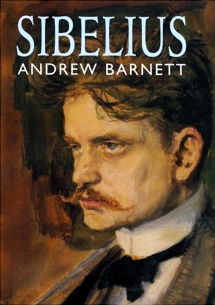|
SCRUPULOUSLY DONE

Andrew Barnett's 'Sibelius',
read by ROBERT ANDERSON
It is a bold man who steps into the Sibelius arena after Erik Tawaststjerna's monumental achievement of originally five volumes, or three as translated by Robert Layton. The ready justification is description of every known piece that came from Sibelius's pen, made possible by the transfer to Helsinki University of much manuscript material as catalogued by Kari Kilpäinen, and since incorporated in Fabian Dahlström's magisterial thematic compendium of 2003. Equally important has been publication by the latter of the Sibelius diaries and appearance of much Sibelius correspondence, which indeed Layton could use in his final volume.
The wealth of available material is indeed daunting. Barnett's way of coping is strictly annalistic. Year by year we chart Sibelius's progress, not just from symphony to symphony, those expressions 'of a spiritual creed, a phase in one's inner life', as Sibelius said (and so different from Mahler's all but the kitchen sink approach), but into the details of every song and piano piece written to keep the home fires burning and make some small impact on Sibelius's crushing mountains of debt. Sibelius's father was declared bankrupt; his son's alcohol binges threatened equal ruin and almost caused divorce from his devoted Aino.

The disadvantages of Barnett's method are obvious. We are a fifth of the book through before we reach 1892 and Kullervo, with much space devoted to juvenilia most of us will never need to hear. And the dispersal of Sibelius's creative achievements amid the details of his daily triumphs and problems prevents any cogent assessment of the music. By eschewing the hallowed life and works approach, Barnett risks belittling the creative mastery amid accounts of situations where Sibelius was anything but master. There is something to be said for Tovey's view that concentration should always be on the fields where great artists display their genius rather than on occasions when they clearly do not.
Barnett's mastery of his material is certainly impressive. He can range back and forth over Sibelius's creative life, pointing to a sketch or completed work that may have offered material towards a later masterpiece, so that the book becomes a veritable network of cross-references. This is thoroughly stimulating, and provides real insight into Sibelius's ways as a composer. The book is so detailed it does not make an easy read, and one looks forweard greatly to the thirteen volumes of BIS Sibelius recordings, with which Barnett is closely associated, that will wondrously provide text for his observations.
Appendix I of the book does indeed provide music examples. These are grouped under such titles as 'Descending fifths', 'Patriotic march themes', 'The S-motif'. This last refers to the all-pervasive gruppetto that dominates so much of Sibelius's melodic thinking, as Barnett's methodical sleuthing reveals on innumerable occasions. But the pity is that there are no references in the body of the book to these examples, so that they live in a distinguished limbo of their own, with little assistance in giving them a precise context.
This book should be a gold mine for future scholars, except that there is a glaring omission which can only deter research. An admirable list of Sibelius's works gives dates of composition, but that is all. Mammoth task though it would have been, each work should be followed by references to all the pages on which its mention occurs. We are otherwise helpless. A second edition might abandon the 'Selective Discography' for a start. Even the main index is thin. Verdi gets no mention, while in the text his Nabucco is wrongly supposed to describe Israelites exiled in Egypt rather than Babylon. Elgar, too, is short-changed, though Salut d'amour, the children's music, and Falstaff (Sibelius thought it confused) appear in the body of the book. So a great deal has been scrupulously done, but some essentials are missing.
Copyright © 21 September 2008 Robert Anderson, Cairo, Egypt

|

